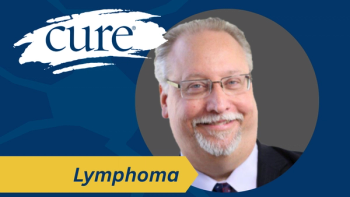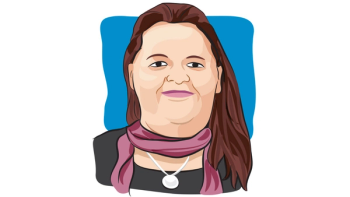
Shining a Light on Life With Lymphoma
At age 26, Juliana Fuller had never met another young patient with lymphoma.
She didn’t have enough information on her specific diagnosis—stage 4 follicular lymphoma—and neither did her oncologist. And she was unsure if having children was a possibility.
That all changed for Fuller after attending the North American Educational Forum on Lymphoma, hosted annually by the
“Before I went to the conference, I met one person who had lymphoma—one older man who was in his late 60s,” says Fuller, now 31. “I felt really alone to be this young adult. I knew that certain types of lymphoma, in general, are really more of an ‘older person’ disease. I said, ‘Gosh, I feel like I am the only person who’s young and has this’. That was a huge part of why it [the forum] was beneficial to me.”
Fuller is one of thousands of patients with lymphoma who have attended the annual conference, which features breakout sessions on lymphoma subtypes and opportunities for patients to inquire with experts. There, she met other young women with similar diagnoses, and was able to learn more about treatment options, which caused her to change from the plan she was on.
“I needed to meet somebody else that was in a similar place in their life,” recalls Fuller. “It made me feel like I wasn’t going through this alone—to be able to relate to somebody [and] to see these people and think ‘oh, they’re normal people’. Sometimes, having this diagnosis made me feel like an abnormal and sick person. But really, I’m functioning and working in the world, and doing all of these normal things. I just have this diagnosis.”
The forum enlightened Fuller and other patients on ongoing research in the field and new drugs that were coming down the pipeline.
“It was so hopeful,” she adds. “You just need to hear that. You need to know that, if your cancer gets worse or you need treatment again, that there are really good options and that the prognosis is getting better and better.”
The LRF presents more than 60 in-person patient education sessions each year, including the North American Educational Forum on Lymphoma. The organization also hosts
“Lymphoma is a very complicated disease with over 70 subtypes, so we try to offer patient education programs so that someone who is diagnosed or being treated for a specific lymphoma subtype can actually learn about it,” says Izumi Nakano, associate director of patient services for LRF.
Aside from in-person sessions, LRF also has
In addition to their education resources, LRF also organizes
The Buddy Program
There is also a helpline, where patients can contact LRF with questions or concerns and be partnered with a volunteer through their
“If someone calls into LRF, and they’re looking to connect with someone in the same situation or diagnosis, they can connect with me,” Fuller says. “They have connected me with other young adults. That has been really rewarding, to be able to listen to their story, see where they’re at, be able to relate and share what helped me.”
The Lymphoma Support Network is how Rose Colella, a patient with Hodgkin lymphoma, found solace in the beginning of her cancer journey.
“LRF was there not only to answer my questions, but to provide me with one-on-one support,” says Colella. “I immediately signed up for the Lymphoma Support Network and, within days, I was put in contact with someone who had been through what I would be going through. They were doing just fine. It gave me hope in a time that was seemingly hopeless.”
When her disease reappeared five years later, she returned to LRF’s Lymphoma Support Network, where a volunteer helped her cope with treatment-related side effects and post-cancer emotions.
Today, Colella, who is cancer-free, became an LRF Ambassador. Like Fuller, she serves as a support system for other patients.
“As weak as the disease makes you feel before, during and after, you truly do end up being stronger in every aspect of your life, love and work,” says Colella. “Helping others understand the disease and treatments, and providing them with hope is a gift I will hope to keep on giving as long as I live.”
A Trusting Resource
For newly diagnosed patients, Nakano assures the information provided by LRF is very trustworthy.
“What a lymphoma patient, caregiver or their family members really benefit from connecting with the foundation is our wealth of resources,” Nakano says “Lymphoma is a very complicated disease. We work diligently with our distinguished Scientific Advisory Board to ensure the foundation provides the most accurate and up-to-date information on lymphoma through educational materials and programs.”
Something else changed for Fuller after attending the North American Educational Forum on Lymphoma, with one of her burgeoning questions finally answered. In 2015, she gave birth to a baby girl.
“I didn’t even think I could have kids,” Fuller reflects. “I didn’t know if it was a wise decision. I just experienced so much hope in going and talking to the specialists. They were really encouraging. There was so much hope there that I felt like I could take this step of faith to get pregnant. She’s the best thing in my life. I’m just really grateful.”




